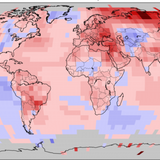RECENT ARTICLES

With the right catalyst, we might make jet fuel from CO₂
Techniques to take atmospheric CO2 and turn it into a fuel provide a climate-friendly alternative to exploiting fossil fuels—they may releases CO2 back into the air when burned, but there's no net change. This includes biofuels crops, but can extend to industrial processes that directly involve CO2. As processes that capture CO2 from ambient air become more economical, so will the potential value of that CO2 as a resource for fuels.There are a few ways to go about making fuel, but all require considerable energy because CO2 is a stable molecule—reversing the combustion reaction to make a...…Techniques to take atmospheric CO2 and turn it into a fuel provide a climate-friendly alternative to exploiting fossil fuels—they may releases CO2 back into the air when burned, but there's no net change. This includes biofuels crops, but can extend to industrial processes that directly involve CO2. As processes that capture CO2 from ambient air become more economical, so will the potential value of that CO2 as a resource for fuels.There are a few ways to go about making fuel, but all require considerable energy because CO2 is a stable molecule—reversing the combustion reaction to make a...WW…

Like Titan, Pluto’s atmosphere is hazy, but for a different reason
Saturn’s moon Titan is distinctive, in part for its orange-ish and hazy atmosphere. It’s virtually impossible to see surface features because the haze is so opaque in the visible portion of the spectrum; what we know of it comes from things like radar imagery, instead. The haze is the product of chemical reactions in the upper atmosphere, driven by ultraviolet radiation. These then cascade into larger and more complex organic (reminder: that doesn’t mean biological) molecules.The New Horizons mission to Pluto showed that the dwarf planet, too, has a haze. It’s less prominent in Pluto’s...…Saturn’s moon Titan is distinctive, in part for its orange-ish and hazy atmosphere. It’s virtually impossible to see surface features because the haze is so opaque in the visible portion of the spectrum; what we know of it comes from things like radar imagery, instead. The haze is the product of chemical reactions in the upper atmosphere, driven by ultraviolet radiation. These then cascade into larger and more complex organic (reminder: that doesn’t mean biological) molecules.The New Horizons mission to Pluto showed that the dwarf planet, too, has a haze. It’s less prominent in Pluto’s...WW…

Company claims solid-state lithium-metal battery breakthrough
All modern lithium-ion batteries are, in a way, a compromise. The original concept was a “lithium metal” battery, which could hold substantially more energy in the same volume. There was just one small problem: they invariably self-destruct. But this week, a long-watched battery-tech company announced that it believes to have solved this problem. If what the company shows is accurate, this is a big deal.First, a brief primer. Lithium batteries shuttle lithium ions from the cathode to the anode during charging, harvesting energy as the ions return to their home in the cathode material. This...…All modern lithium-ion batteries are, in a way, a compromise. The original concept was a “lithium metal” battery, which could hold substantially more energy in the same volume. There was just one small problem: they invariably self-destruct. But this week, a long-watched battery-tech company announced that it believes to have solved this problem. If what the company shows is accurate, this is a big deal.First, a brief primer. Lithium batteries shuttle lithium ions from the cathode to the anode during charging, harvesting energy as the ions return to their home in the cathode material. This...WW…

New analysis: Extreme flows in US streams are rising
Climate change involves direct consequences on the cycling of water through our environment. The warmer atmosphere holds more moisture, making intense rainstorms dump even more water than they used to. On the flip side, warmer air can suck even more moisture out of the ground through evaporation, worsening droughts. These things should obviously result in changes for streams. But the amount of water in streams varies wildly under normal conditions, and it can also be affected by more than just weather. Finding trends in that data has proven difficult.A new study led by Evan Dethier at...…Climate change involves direct consequences on the cycling of water through our environment. The warmer atmosphere holds more moisture, making intense rainstorms dump even more water than they used to. On the flip side, warmer air can suck even more moisture out of the ground through evaporation, worsening droughts. These things should obviously result in changes for streams. But the amount of water in streams varies wildly under normal conditions, and it can also be affected by more than just weather. Finding trends in that data has proven difficult.A new study led by Evan Dethier at...WW…

New “targeted healing” approach rejuvenates run-down battery materials
As electric vehicle adoption grows, the need for battery recycling is growing along with it. Typically, recycling involves breaking the battery down into pure chemical components that can be reconstituted for brand-new battery materials. But what if—at least for some battery chemistries—that’s overkill?A new study led by Panpan Xu at the University of California, San Diego shows off a very different technique for lithium-iron-phosphate (LFP) batteries. This isn’t the most energy-dense type of lithium-ion battery, but it is economical and long-lived. (It’s the chemistry Tesla for...…As electric vehicle adoption grows, the need for battery recycling is growing along with it. Typically, recycling involves breaking the battery down into pure chemical components that can be reconstituted for brand-new battery materials. But what if—at least for some battery chemistries—that’s overkill?A new study led by Panpan Xu at the University of California, San Diego shows off a very different technique for lithium-iron-phosphate (LFP) batteries. This isn’t the most energy-dense type of lithium-ion battery, but it is economical and long-lived. (It’s the chemistry Tesla for...WW…

A La Niña winter is on the way for the US
September apparently wasn’t feeling like doing anything unusual, so it ended up being the warmest September on record for the globe. That’s been something of a trend this year, with each month landing in its respective top three. It has become increasingly clear that 2020 will likely be the second warmest year on record, if it isn’t .Unlike in August, the contiguous US didn’t set a record in September, though it was still above the 20th-century average. A high-pressure over the West Coast again, leading to even more warm and dry weather for much of the Western US. But a trough set up over...…September apparently wasn’t feeling like doing anything unusual, so it ended up being the warmest September on record for the globe. That’s been something of a trend this year, with each month landing in its respective top three. It has become increasingly clear that 2020 will likely be the second warmest year on record, if it isn’t .Unlike in August, the contiguous US didn’t set a record in September, though it was still above the 20th-century average. A high-pressure over the West Coast again, leading to even more warm and dry weather for much of the Western US. But a trough set up over...WW…

This machine takes office-air CO₂ and turns it into fuel
At Ars, we get a lot of pitches from start-ups that want to talk about their products. At least for this science reporter, the feeling is rarely mutual. But once in a while, something piques my curiosity. Something like… carbon capture for an office HVAC system.Over a video call, Finnish start-up Soletair Power recently showed off a unit operating in its office. It had been built for the 2020 World Expo in Dubai, but, well, you know what has happened to expos. Instead of powering an expo booth, there was a gas-powered espresso maker bolted onto the unit—since this machine turns CO2 into...…At Ars, we get a lot of pitches from start-ups that want to talk about their products. At least for this science reporter, the feeling is rarely mutual. But once in a while, something piques my curiosity. Something like… carbon capture for an office HVAC system.Over a video call, Finnish start-up Soletair Power recently showed off a unit operating in its office. It had been built for the 2020 World Expo in Dubai, but, well, you know what has happened to expos. Instead of powering an expo booth, there was a gas-powered espresso maker bolted onto the unit—since this machine turns CO2 into...WW…

Here’s how DOE’s first crop of risky energy tech has done
In 2009, the US Department of Energy started funding energy research through the Advanced Research Projects Agency–Energy (or ARPA-E) program. The goal was to take more risks than traditional federal efforts and help new renewable energy technologies get off the ground. Private investment had been flagging due to slow returns, but the huge societal benefit of clean energy was deemed to justify government support. The hope was that the funding could accelerate the timeline for new technology to mature to the point that private investors would find the technology more attractive.At least,...…In 2009, the US Department of Energy started funding energy research through the Advanced Research Projects Agency–Energy (or ARPA-E) program. The goal was to take more risks than traditional federal efforts and help new renewable energy technologies get off the ground. Private investment had been flagging due to slow returns, but the huge societal benefit of clean energy was deemed to justify government support. The hope was that the funding could accelerate the timeline for new technology to mature to the point that private investors would find the technology more attractive.At least,...WW…

Greenland is about to lose ice faster than any time since the last ice age
While the GRACE satellites were active, their incredibly precise gravity measurements of about 280 billion tons of ice from Greenland each year. That's glacial land ice that raises sea level as it flows into the ocean—and it's vanishing at a remarkable clip. But just how remarkable is that clip? We don't have such excellent measurements going back too far into Greenland's history.A new study led by the University of Buffalo's takes this question on. We have lots of paleoclimate records of climate conditions in Greenland, the position of the ice on the landscape, and even changes in...…While the GRACE satellites were active, their incredibly precise gravity measurements of about 280 billion tons of ice from Greenland each year. That's glacial land ice that raises sea level as it flows into the ocean—and it's vanishing at a remarkable clip. But just how remarkable is that clip? We don't have such excellent measurements going back too far into Greenland's history.A new study led by the University of Buffalo's takes this question on. We have lots of paleoclimate records of climate conditions in Greenland, the position of the ice on the landscape, and even changes in...WW…

The Arctic Ocean may have gone fresh in ice age times
The Arctic Ocean is many things. Cold and icy come to mind, of course, but "salty" should as well—it’s an ocean, after all. Yet a new study suggests that during certain ice age periods, the Arctic Ocean and the adjacent Greenland and Norwegian Seas (you can guess where those are if you don’t know) were filled with freshwater.The paleo evidence for this idea is pretty subtle. The isotope thorium-230 is produced from the decay of uranium-234, which exists in seawater proportionally to its salinity. While the uranium dissolves in seawater, thorium tends to precipitate and fall to the seafloor....…The Arctic Ocean is many things. Cold and icy come to mind, of course, but "salty" should as well—it’s an ocean, after all. Yet a new study suggests that during certain ice age periods, the Arctic Ocean and the adjacent Greenland and Norwegian Seas (you can guess where those are if you don’t know) were filled with freshwater.The paleo evidence for this idea is pretty subtle. The isotope thorium-230 is produced from the decay of uranium-234, which exists in seawater proportionally to its salinity. While the uranium dissolves in seawater, thorium tends to precipitate and fall to the seafloor....WW…